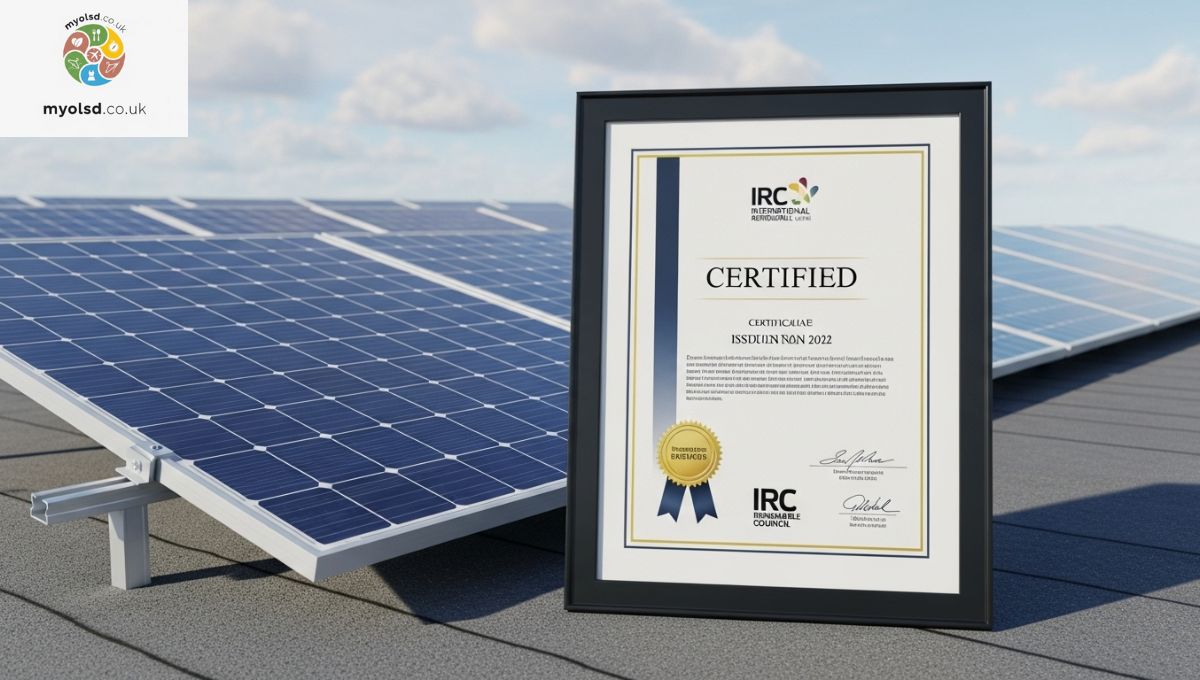Ever felt confused about all the rules and certificates when setting up solar panels? You’re not alone many homeowners and businesses jump into solar energy only to find themselves stuck on paperwork and approvals. One term that often pops up and leaves people scratching their heads is what is IRC certificate for solar panels. It can feel overwhelming trying to figure out if it’s important or just another piece of red tape.
This blog will clear up that confusion and explain exactly what the IRC certificate for solar panels is, why it matters, and how it affects you. You’ll learn what it means, how to get it, and why it’s essential for safety, incentives, and legal compliance. By the end, you’ll have a clear picture of this certification and feel confident about your solar energy journey.
What Is the IRC?
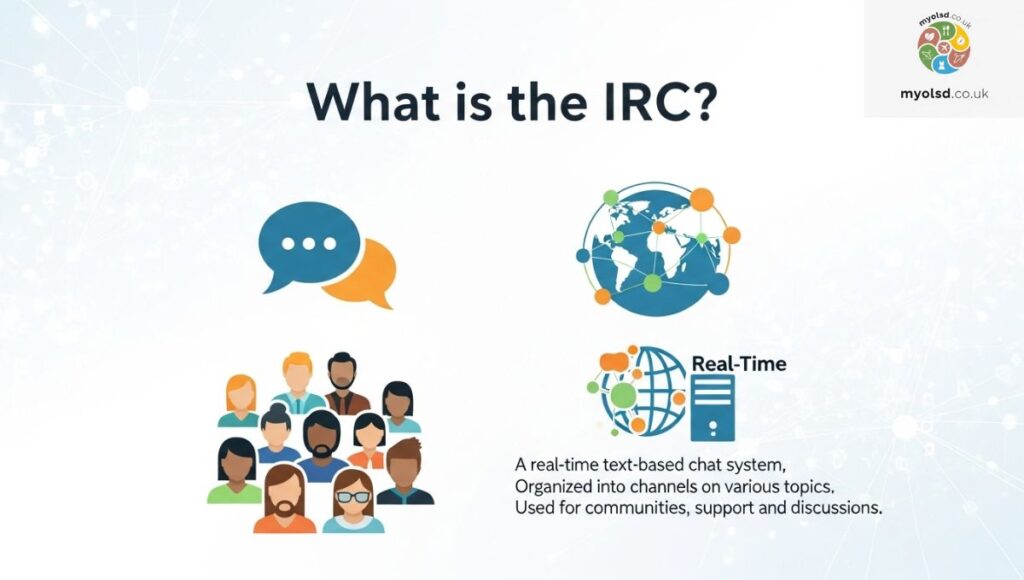
The IRC stands for the International Residential Code. It’s a set of standards created by the International Code Council that lays out safety, structural, and installation requirements for residential buildings including solar panel systems. In simpler terms, it’s like a rulebook that ensures your solar project is built safely and legally.
When it comes to solar panels, the IRC covers everything from how panels are mounted to how electrical wiring connects to your home’s system. Following these standards is essential because it protects homeowners, installers, and the wider community from risks like fire, structural damage, and electrical hazards.
What Makes the IRC Necessary for Solar Panels?
Solar installations aren’t just about putting panels on a roof. They involve electrical systems, inverters, grounding, and sometimes heavy loads on your building’s structure. Without a standard like the IRC, there would be no consistent way to ensure safety, quality control, and legal compliance.
For example, the IRC specifies details like load-bearing capacity, wind load calculation, snow load, panel placement, and emergency shut-off mechanisms. Meeting these standards means your system is more likely to qualify for subsidies, net-metering, and better insurance terms all while giving you peace of mind.
Read more Article:What is PEVA Cloth?
What is the meaning of an IRC certificate for solar panels?
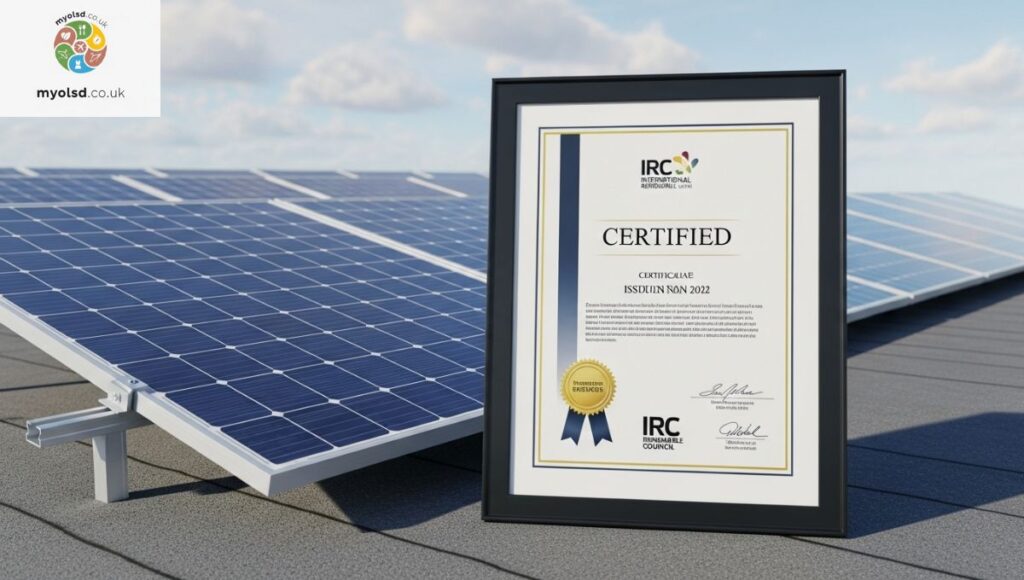
An IRC certificate is proof that your solar installation meets the safety and compliance requirements outlined in the code. Think of it as your project’s green light from the authorities. Without it, your system might not be eligible for incentives like tax credits, rebates, or even grid connection approval.
This certificate typically involves an inspection by a certified authority or third-party verifier. They’ll check things like inverter operation, system grounding, cable management, site inspection records, and compliance documentation. Once everything checks out, the certificate is issued and you can proceed to connect your system to the power grid.
Safety
Safety is the number one reason the IRC certificate exists. Solar panel systems handle high-voltage electricity and add weight to your roof. The IRC ensures that these systems follow strict installation standards to prevent electrical fires, structural failures, and accidents.
Insurance
Many insurance companies require proof of code compliance before they’ll cover a solar installation. Having the IRC certificate can lower your risk profile and help you get better coverage or reduced premiums for your home and solar equipment.
Peaceful State of Mind
Finally, an IRC certificate gives you confidence. It tells you your system has been inspected, meets recognized standards, and is safe to operate. You’ll know you’re protecting your investment and your home.
How can you obtain an IRC certificate for solar panels?
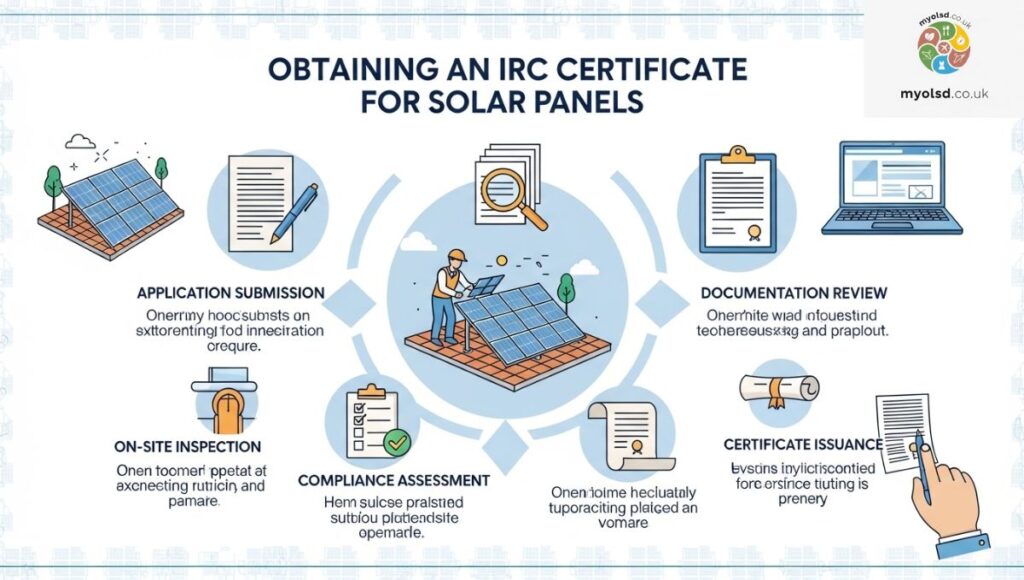
Getting the certificate isn’t as complicated as it sounds. Usually, your installer or EPC contractor will handle most of the paperwork and scheduling. The process begins with submitting technical drawings, system specifications, and installation plans to your local building authority.
Once installation is complete, a government inspector or certified professional engineer visits the site to check that everything matches the approved design. They’ll verify details like wiring design, inverter placement, grounding, weatherproofing, and emergency shut-off mechanisms. If your system passes, the certificate is issued, giving you the legal approval to connect to the grid.
How Building Codes Affect Local Communities
Building codes like the IRC aren’t just about individual homes they protect entire neighborhoods. Properly installed solar systems reduce fire risks, prevent grid instability, and ensure safe emergency access for firefighters. In many regions, compliance also supports the clean energy transition by making solar installations more reliable and trustworthy.
In places like India, Kenya, or the Middle East, following local versions of these standards can also unlock government incentives and financing options. By ensuring your system meets these codes, you’re not only protecting yourself but also contributing to a stronger, safer renewable energy market.
Advantages of IRC
Complying with IRC standards for solar panel installations offers multiple benefits. First, it increases your eligibility for subsidies, tax credits, and net-metering programs. Utility companies often require proof of compliance before allowing you to export power to the grid.
Second, it enhances your property value. Homebuyers are more confident in purchasing homes with code-compliant solar systems because they know the installation is safe and approved. Third, it improves system performance by ensuring your setup meets quality and safety standards set by certified authorities.
IRC Certificate vs. Other Certifications
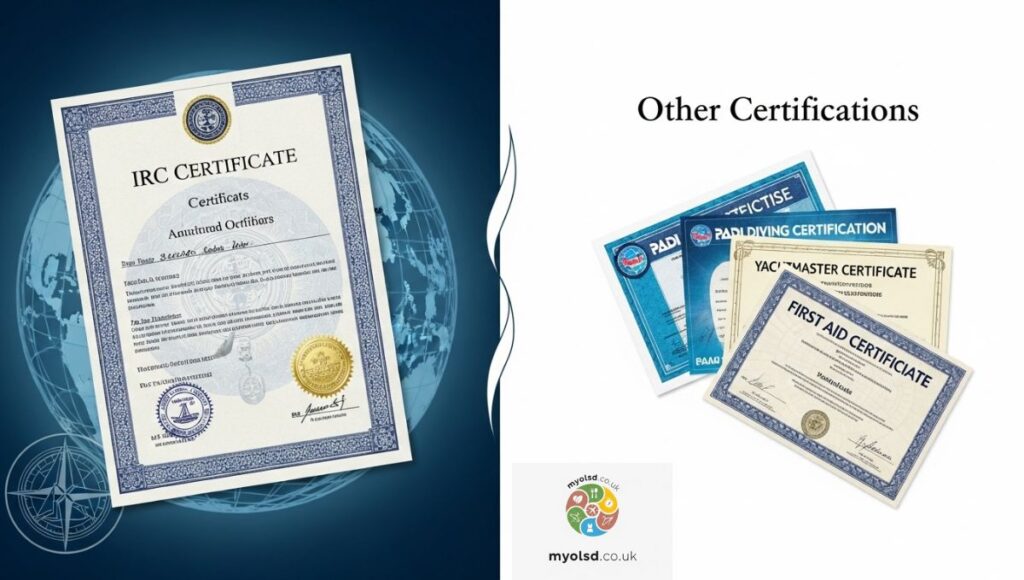
Not all certificates are created equal. For example, IEC standards (like IEC 61215 or IEC 61730) and UL standards (such as UL 1703 or UL 1741) focus on product-level compliance testing panels and inverters for durability, safety, and performance. In contrast, the IRC certificate verifies the installation itself.
Think of it like this: IEC and UL make sure the equipment is good; the IRC certificate makes sure it’s installed correctly. Together, these certifications provide complete assurance of quality and safety for your solar project.
Major Benefits of Having an IRC Certificate
Having the IRC certificate for your solar panels brings real-world benefits beyond just compliance. It can help you secure financing, since many banks and government programs require proof of safe installation before releasing funds. It can also speed up your grid interconnection approval, avoiding delays in switching on your system.
Another hidden benefit is insurance and resale value. When you have a documented, code-compliant installation, your system is easier to insure and may fetch a higher price if you sell your property. Buyers and insurers see it as proof of a professional, safe, and legally approved solar setup.
How Long Does It Take to Get the IRC Certificate?
The time frame varies by location and workload of local inspectors. In many regions, the certificate can be issued within a few days after the final inspection. However, delays can occur if paperwork is incomplete, if low-quality equipment is used, or if the installation doesn’t match the approved design.
Working with a certified installer or EPC contractor who understands the process can help you avoid these delays. Keeping your documents like purchase invoices, warranty papers, and technical records ready can also speed things up.
What If the System Fails the Inspection?
If your system doesn’t pass inspection the first time, don’t panic. The inspector will provide a list of issues to correct. These might include missing insulation, improper wiring, or incorrect panel placement.
Once the issues are fixed, you can schedule a re-inspection. This process is common and is simply part of ensuring the highest safety and quality standards for your installation.
Is the IRC Certificate Required Everywhere?
The IRC certificate applies primarily to regions that follow the International Residential Code or its local adaptations. In some areas, different building codes or certifications may be required. Always check with your local building authority to understand which rules apply to your project.
Even if it’s not legally required in your area, following IRC standards voluntarily can still bring benefits like improved safety, better insurance terms, and stronger resale value.
Tips to Make the Process Easier

- Choose an experienced installer. Certified professionals understand the requirements and can handle the paperwork for you.
- Ask questions. Don’t hesitate to clarify timelines, costs, and responsibilities.
- Be available for inspections. Being on-site can speed up communication with inspectors.
- Keep your paperwork handy. Having technical drawings, invoices, and permits ready can reduce delays.
Following these tips will make getting your IRC certificate smoother and faster.
Final Thoughts
Understanding what is IRC certificate for solar panels isn’t just about ticking a bureaucratic box. It’s about protecting your investment, your home, and your family. By ensuring your installation is code-compliant, you gain access to incentives, improve safety, and secure peace of mind.
Whether you’re a homeowner installing a small rooftop system or a business developing a large-scale solar project, following IRC standards is a smart move. It’s the key to safe, reliable, and legally approved solar power.
FAQS
How to check eligibility for solar panels?
Check your local government or utility company’s solar incentive program and building code requirements.
What is the full form of IR in solar panels?
IR stands for Insulation Resistance in solar panels.
What is the name of solar certificate?
It’s commonly called the IRC Certificate (International Residential Code Certificate) for installations.
What is the registration code for solar scheme?
The registration code is the unique ID issued by the government or agency when applying for a solar subsidy scheme.

